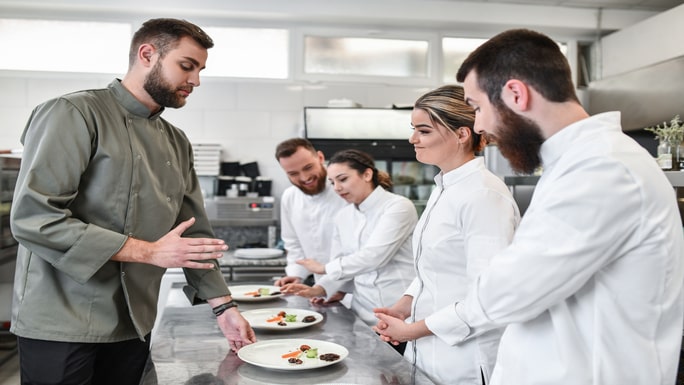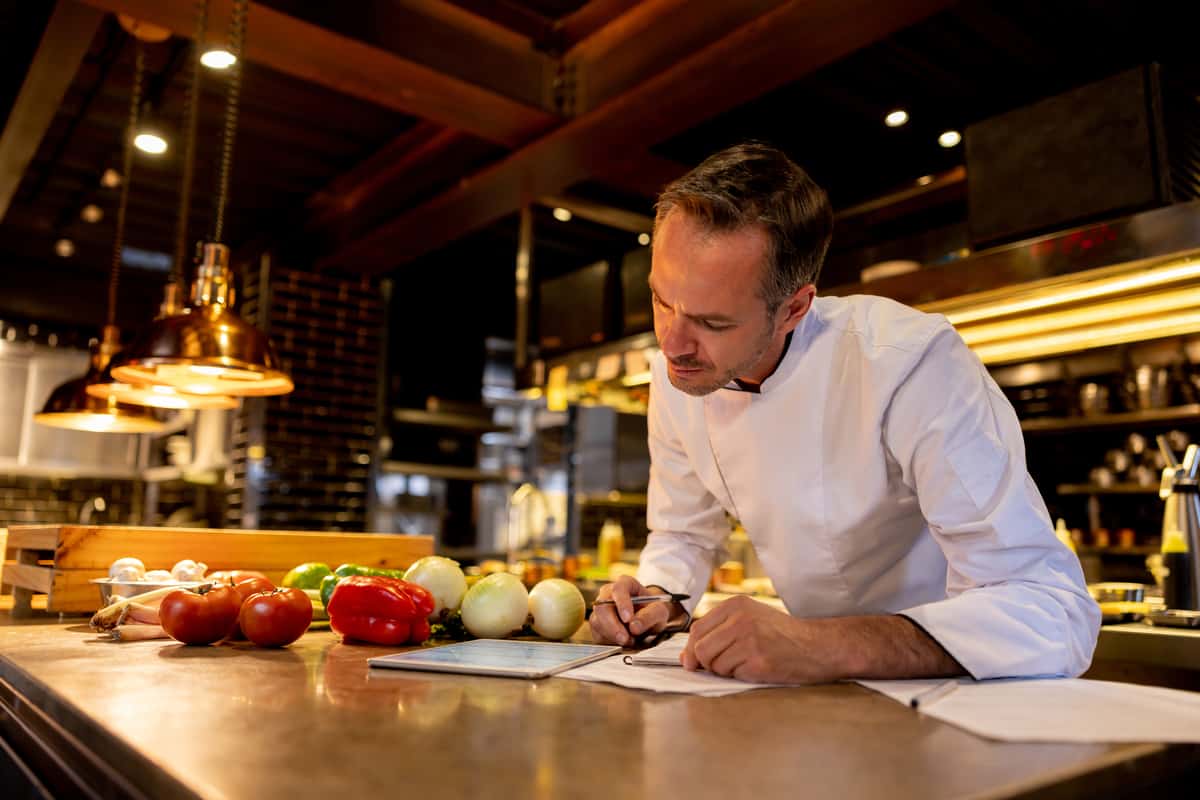The value of the global food and beverage market grew to more than $7,000 billion in 2023. Success in the demanding food and beverage industry can be lucrative but the journey to it may also be complex. That’s where the expertise of food and beverage consultants comes in, as these specialists help businesses bring their culinary visions to life.
Food and beverage consulting delivers invaluable knowledge in areas such as opening new restaurants, improving existing establishments, devising effective marketing strategies, and creating efficient business operational plans. In this article, we explore the responsibilities, advantages, and challenges faced by those pursuing success in the field of food and beverage.
Introduction to food and beverage consulting
Food and beverage consulting, commonly referred to as F&B consulting or food consultancy, is a comprehensive service that supports restaurant entrepreneurship. From guiding individuals in developing their dining concepts to ensuring efficient operations for established businesses, F&B consultants provide expertise on various levels to improve profitability and customer satisfaction.
What is food and beverage consulting?
Food and beverage consulting is a specialist position in the gastronomy industry that helps established and emerging businesses achieve success. Consultants offer unbiased evaluation, constructive feedback and practical recommendations based on a number of predetermined objectives. The scope of food consultancy ranges from restaurants to breweries, all to improve operations and profitability.
Food and beverage consulting stand apart from traditional business consultancies by addressing the unique and specialized needs of this sector. It leverages expertise in areas such as food science, hospitality regulations, and customer behavior in dining settings along with strategic know-how built up through experience.
The main aim is to identify and address issues, such as cuisine selection, menu pricing, operational efficiency, and ambiance. As a consultant, you would then develop strategies in these areas to achieve the client’s vision.
Types of food and beverage consulting services
Food and beverage consulting covers a wide range of services to meet the unique needs of clients. Consultants offer guidance in various areas and provide a broad spectrum of expertise, which we have summarized below.
Restaurant concept development consulting
At the heart of any dining establishment is its concept. Restaurant management skills are a crucial element of this, so F&B consulting companies specialize in offering expert guidance on creating innovative restaurant concepts or revitalizing existing ones. Consultants can help identify the target audience, analyze market trends, and select a culinary style that not only aligns with the owner’s vision but also ensures commercial success.
Food service facility design consulting
Creating an effective layout for your restaurant is essential for smooth operations, so consulting a professional firm specializing in food service facility design can pay off. They will help you develop detailed kitchen floor plans, strategically organize key areas such as cleaning and storage, and even suggest optimal seating arrangements to improve the customer experience. Their expertise also ensures all safety codes are met while creating visually appealing spaces.
Menu pricing engineering consulting
Menu engineering can help drive profits, so it’s crucial to have an effective pricing structure that balances cost proportions with retail prices while ensuring taste and quality are maintained. Consultants can help achieve a win-win situation by considering variables such as ingredient costs, preparation time, and equipment requirements, all while keeping profit margins in mind.
Restaurant operations consulting
Efficiency is crucial for the success of any business, including restaurants. Operational consultants skilled in efficiency can identify areas that may hinder smooth business operations, such as staff training schedules or procurement cycles. They then propose strategies to minimize costs without compromising product quality or customer service in the restaurant.
Food and beverage management consulting
Effective supplier management is key in the food and beverage industry, especially due to the perishable nature of many products. To navigate this challenge, it’s often helpful to seek expert advice from food and beverage management consultants who specialize in overseeing every aspect of the supply chain. From sourcing raw materials to ensuring safe transportation until they reach the final consumer, these consultants also guide compliance with regulatory laws such as FSMA and FDA guidelines. By working with them, businesses can optimize their operations.
Bar beverage development consulting
If you want to set up an establishment that serves drinks, a bar beverage development consultancy can be incredibly helpful. Beverage consultants specialize in curating signature cocktail recipes, monitoring supply chains, and ensuring legal compliance. With extensive knowledge of global alcohol trends and access to a wide array of ingredients, they help devise innovative concepts that can make a bar stand out from the competition.
SWOT analysis consulting
Designed to help identify strengths, weaknesses, opportunities, and threats (SWOT), this type of consultancy will thoroughly examine you and your competition and provide a custom action plan.
They help you set focused goals and objectives with achievable targets, taking into consideration factors such as funding availability, timeline, and control measures. This type of consultancy can make all the difference in the fierce F&B marketplace.
Food and beverage marketing consulting
Effective food and beverage marketing strategies can help you stand out and create memorable experiences for customers. Combining traditional marketing approaches with digital tools to capture attention online and offline will help attract consumers and encourage them to visit your establishment.
Research by the Association for Consumer Research suggests a well-written description alongside menu items can increase sales by up to 27%. Making sure your offerings are Instagram-worthy can deliver cost-effective returns, so it’s worth enlisting digital marketing experts to harness the power of social media.
Qualifications for food and beverage consultants
You need a wide range of skills if you want to succeed in food and beverage consulting. These requirements include culinary expertise and business acumen alongside important soft skills such as effective communication and problem-solving. The following qualities will help you achieve success in this industry.
Relevant work experience
The most important requirement is having relevant experience in the restaurant industry or a related field. This could include positions such as chefs, restaurant managers, nutritionists, or even sommeliers. Any role that gives hands-on experience with food and beverage is useful.
Gaining experience in various aspects of the dining industry, including menu creation, customer preferences, operational efficiency, and cost control, can also help you develop deeper understanding.
If you have worked with food consultancy companies, you will gain a broader perspective on different parts of the industry, which can boost your credibility as a consultant.
Building a network and reputation
Building relationships in the food and beverage industry if you want to be a successful F&B consultant. Networking at culinary events, seminars related to bar consultancy, or engagements hosted by restaurant consultancy firms is a great way to expand your professional network.
Staying connected with influential figures on social media platforms can also be a source of advice or even mentorship. Positive testimonials from satisfied clients can help you build your reputation, improve your credibility and trustworthiness, and even lead to more career opportunities.
Qualifications and degrees
A great way of preparing yourself for a food and beverage consultancy role is to study for a hospitality degree or a culinary degree. Either of these will help give you the skills needed to manage restaurants or other food-related businesses.
Take advantage of our cutting-edge facilities, industry-leading mentors and exclusive placements with our immersive masters degree.

Tips for finding clients
If you work as a freelance consultant or run your own consultancy, there are several strategies you can draw on to attract clientele. All of these help improve your professional standing and make you stand out from the crowd:
- Offer free educational content, such as ebooks, blogs, guides, and do seminars.
- Current client referrals can win you new customers as people put a lot of trust in word-of-mouth recommendations
- Join professional organizations to help boost your credibility and customer trust in your services.
- Present yourself credibly so prospective clients recognize the value they’ll gain by retaining your consultation services.
- Networking with other professionals can help you find options for collaboration, and it starts when you study with a renowned hospitality degree, where you’ll be able to network with other students, tutors, and industry leaders.
Learn how to guide businesses in hospitality consulting while acquiring essential skills that will make you stand out from the rest.

Marketing yourself
Promoting your brand helps prospects see what you offer in food and beverage consulting and is often a mix of strategic action and consistency. There are a few techniques you can use, such as:
- Creating a compelling online presence
- Harnessing social media
- Building an impressive portfolio
Challenges and opportunities in food and beverage consulting

Navigating the intricacies of food and beverage consulting can be challenging. But a rewarding career in this industry can offer up incredible opportunities. Below are some of the most frequent issues encountered by food and beverage consultants.
Common challenges faced
Some of the main challenges you will face in this field are:
- Industry volatility: Food and beverage consultants can face unpredictable conditions, especially in periods of economic downturn.
- Difficult clients: Some clients may display resistance to recommendations or are uncooperative.
- Regulatory compliance: The rules and laws around catering change all the time, so you need to stay on top of these requirements.
- Keeping pace with trends: Staying abreast of trends such as gluten-free and vegan diets means you need to be committed to continuous learning.
Identifying these challenges early on will help you develop strategies for dealing with them efficiently.
Opportunities for growth and advancement
Despite any hurdles, there are many exciting avenues for growth in the food and beverage consulting sector, such as:
- Emerging markets: access to new markets offers rich potential for gaining new clients for your innovative solutions
- Digital transformation: digital platforms can streamline services offered as well as exponentially enhance audience reach, creating new sources of revenue generation for consultants. For example, some consultancy jobs working with brand image can be handled at a distance via video conferences.
- Consumer preferences evolution: shifts in consumer tastes open up opportunities for consultants to focus on niche segments such as veganism or molecular gastronomy
- Collaborative projects: teaming up with other professionals can help you develop tailored solutions in specific market segments
Importance of staying up to date with industry trends
Staying informed about industry trends is critical to survival in a fast-paced profession such as food and beverage consultancy. It helps consultants anticipate changes and take action to stay ahead of competitors. Awareness also empowers the consultant to advise clients accurately on key matters affecting performance. For example, sustainability is one area currently shaping the strategies of many F&B consulting companies.
Embracing innovation can help you stand out from the crowd. Keep an eye on emerging market research reports, participate actively in seminars and maintain active memberships of relevant professional bodies to help you stay ahead of the game.
Examples of successful food and beverage consultants
If you want to succeed in the industry, it’s worth drawing inspiration from accomplished food and beverage consultants who have helped transform their clients’ visions into profitable realities. These include:
- Joe Smith – The tasty insight
Joe Smith is a highly experienced restaurant operations consultant who has developed his expertise throughout 20 years in the field. He specializes in helping restaurants across the US maximize cost efficiency and improve their operational effectiveness.
- Lisa Chen – Menu makeover
Lisa Chen is an expert in menu pricing and provides consulting services for dining establishments. With her innovative pricing strategies, she helps businesses avoid financial challenges and achieve significant profit growth.
- Mark Jennings – Sliquid solutions
Mark Jennings has built a reputation for his exceptional skills in bar consultancy. He designs beverage offerings that not only improve the overall customer experience but also drive increased profitability. His cocktail menus are known for seamlessly blending creative concoctions with smart financial decisions.
- Francis Lee and Denise Harper – Restaurant reshape
These talented consultants specialize in food and beverage management. Their expertise lies in providing comprehensive solutions that revitalize struggling businesses, incorporating current trends and anticipating future growth opportunities.
If you want to join the ranks of successful consultants in the food and beverage industry, a great start is to study hospitality or culinary arts. These programs can help you get the experience and skills you need.
Harness the expert insights of our industry-leading team, develop skills during immersive placements and expand your networks with our comprehensive degree.

Conclusion
Food and beverage consulting is a varied field, and you will need to have many strings to your bow. The role involves restaurant concept development, facility design, menu planning, and food and beverage management, as well as a range of other tasks. As a career, F&B consulting is a demanding choice, but one that offers constant variation, new challenges, and unlimited opportunities to grow and develop. It lets you express your creativity while working on new projects regularly. A great way of breaking into this world is by studying for a hospitality degree at a renowned institution such as Les Roches. It’s also important to build on your skills and get experience in the food and beverage field.
Main Image:
Hispanolistic/ E+ Via Getty Images




